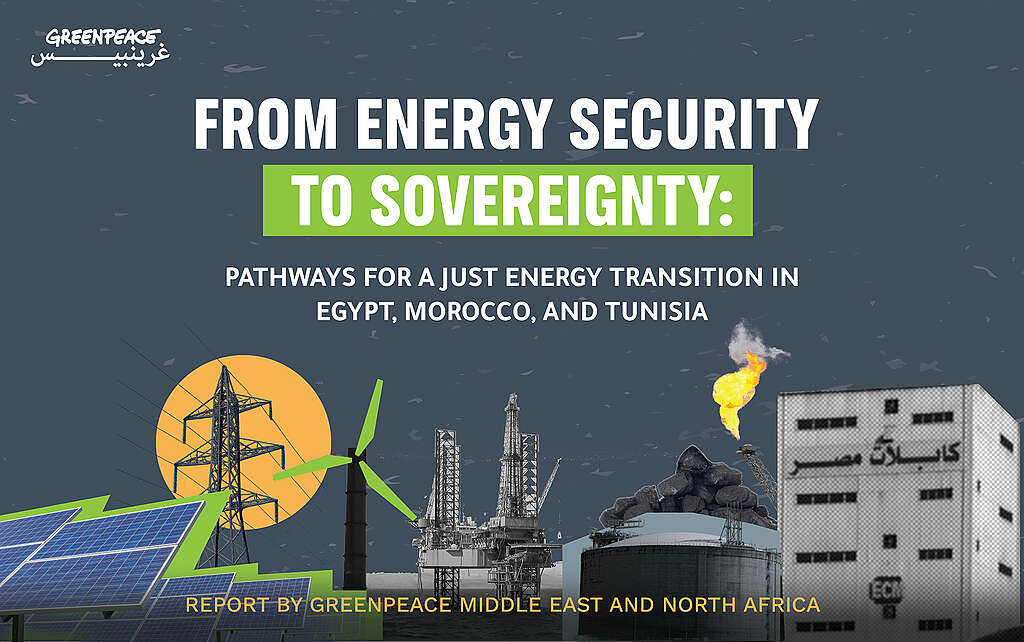
| Despite the significant renewable energy potential and ambitious targets in Egypt, Tunisia, and Morocco, the energy transition remains largely shaped by external actors, profit motives, and export interests. While technology is advancing the shift, power dynamics stay unchanged, risking the replication of historical inequalities and dependencies associated with fossil fuels. |
A major new report by Greenpeace Middle East and North Africa, From Energy Security to Sovereignty: Pathways for a Just Energy Transition in Egypt, Morocco, and Tunisia, highlights that the region’s shift toward renewable energy is still largely controlled by foreign investors and international institutions. While Egypt, Tunisia, and Morocco have begun adding renewable projects, the report finds that these changes prioritize European markets and export revenues over local needs, keeping power, technology, and profits largely outside the region.
The investigation uses an Energy Sovereignty Index to examine who controls energy resources, who benefits, and how policy decisions are constrained. It maps fossil-fuel value chains, current energy mixes, and utility-scale renewable projects, revealing that North Africa is adopting new technologies faster than it is changing the rules of who holds power. Many so-called “solutions”, like carbon capture or large-scale privatized renewable projects, deepen dependency and leave local communities with little benefit.
The report outlines concrete pathways for a just transition. These include phasing out new fossil fuel exploration, prioritizing local energy supply, expanding distributed renewable systems such as rooftops and microgrids, and ensuring communities and workers directly benefit. Financing tools such as polluter-pays levies, strategic litigation, and revenue-sharing mechanisms can help turn private profits into public repair, environmental protection, and social benefits.
The energy transition in North Africa is as much a governance challenge as a technological one. Public assets, contracts, and grids must deliver tangible benefits to communities. Transparency, domestic-priority policies, and regional cooperation can ensure fair pricing, labor rights, and ecosystem protection.
Ultimately, the report shows that North Africa can meet its energy needs and climate goals, but only if energy sovereignty, fairness, and accountability are central to the transition.
The report’s key insights can be summarized as follows:
1. Technology is changing, but power dynamics remain the same.
Renewable energy is expanding across Egypt, Tunisia, and Morocco, but ownership, profits, and strategic decisions remain dominated by foreign investors, international financial institutions, and export-oriented agreements. The region is “transitioning” without shifting who holds real power.
2. All three countries face a major energy sovereignty deficit.
Using the Energy Sovereignty Index, Egypt scores 4.5/10, Tunisia 4.25/10, and Morocco 5.5/10. The weakest dimensions are resource control and policy autonomy, showing how external actors shape energy decisions.
3. Export-first renewable & hydrogen mega-projects risk creating green sacrifice zones.
Large solar, wind, and hydrogen projects, especially in Egypt and Morocco, are designed mainly to serve European markets. Communities often lose land and water access while receiving little benefit, raising the risk of green neo-colonialism.
4. North Africa remains heavily dependent on fossil fuels despite high renewable potential.
Fossil fuels still supply 94% of Egypt’s, 88% of Tunisia’s, and 91% of Morocco’s energy. Egypt remains gas-locked, Tunisia import-dependent, and Morocco coal-dependent. Deep diversification is essential for both climate action and sovereignty.
5. False solutions are delaying real transition.
The report identifies misleading approaches such as carbon capture and storage, blue hydrogen, and rebranding by international oil companies. Policy frameworks like BOO/PPP contracts lock in foreign profit while sidelining public benefit.
6. Communities see almost no benefit from energy projects.
Local communities receive only 1–3 cents per dollar from fossil operations, and renewable mega-projects rarely include community ownership, dividends, or long-term development benefits.
7. IMF conditionalities and foreign financing shape national energy policy.
Subsidy reforms, tariff structures, and hydrogen strategies in all three countries are heavily influenced by IMF programs, European energy priorities, and donor financing, limiting domestic decision-making.
8. Distributed, community-owned renewables are the strongest pathway to sovereignty, but remain neglected.
Rooftop solar, microgrids, agricultural solar, village cooperatives, and municipal energy models offer clear, locally controlled solutions but receive far less attention than export-driven megaprojects.
9. Justice and sovereignty require enforceable mechanisms for accountability, not promises.
The report calls for mandatory domestic offtake floors, community dividends, and revenue-sharing mechanisms, such as directing 15–25% of energy output to local users and funding community trusts with a share of project revenues.
10. Legal and financial mechanisms are needed to ensure climate debt commitments for a just transition are mandatory, not voluntary.
Polluters Pay measures, strategic litigation grounded in the 2025 International Court of Justice (ICJ) advisory opinion, and other accountability mechanisms ensure that states and corporations historically responsible for climate harm are held accountable.

Make oil, coal and gas corporations pay their fair share for the damage they cause.
Add Your Name